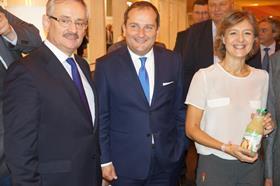
Spain has become a key target for Polish fresh produce exporters, who were represented in force at this year’s Fruit Attraction. Twenty-one Polish companies took part in the event, which was held in Madrid earlier this month, up from seven in the 2013 edition.
The Polish stand, which officially opened by Tomasz Arabski, Poland’s ambassador to Spain, was four times bigger than last year, demonstrating the commitment the eastern European country has made to boosting its presence on the Spanish market.
As well as being the world’s leading exporter of fresh apples, Poland is the fourth biggest producer of fruits and vegetables in the European Union. Last year it shipped 11,000 tonnes of apples to Spain, itself one of the biggest apple importers in the EU.
Poland is heavily reliant on the Russian market and one of the countries that stand to lose the most from the Russian ban on EU agricultural products. Of the 1.2m tonnes of apples Poland exported last year, around 700,000 tonnes were shipped to Russia.
Speaking at the opening of the Polish stand, Arabski said the country was keen to maintain its position as the world’s biggest apple exporter in spite of the ban and had identified Spain, along with markets in Africa and Latin America as some of the markets with the most potential for growth.
Last year, Poland produced 8.1m tonnes of fruits and vegetables, including a record 3.5m tonne apple crop. Arabski said apples had become the country’s star export product, highly prized for their unmistakable flavour and competitive price. Poland also leads European production in cherries, persimmons, raspberries, carrots, cabbage and beetroot, and is the second biggest producer of strawberries, cucumbers and onions.
“The spectacular rise in production volumes has come about whilst maintaining the highest quality standards and using only natural growing methods,” said Witold Boguta, president of Poland’s National Association of Fruit and Vegetable Producer Groups. “We have made a strong commitment to the environment, as demonstrated by the government ban on the use of GM seeds, introduced in January 2013. Polish producers are committed to providing consumer satisfaction with every product they buy.”
Earlier this year, the European Union announced that it was to direct some €32bn, through the Common Agricultural Policy, into Polish agriculture and rural areas over the next six years.



